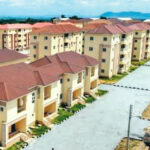NO fewer than 22 million people in Lagos rely on groundwater for survival, Prof. Oluseyi Temilola of the Department of Chemistry, University of Lagos, has said.
The professor highlighted this in her presentation on: “Saline Intrusion into Groundwater: The Case of Coastal Communities in Lagos,’ during the 2025 World Water Day Commemoration Symposium in Lagos, themed: ”Putting Glacier Preservation At The Core of Climate Action Plan.”
The university lecturer, in her presentation, focused on the growing threat of saline intrusion to Lagos due to climate change and urbanization, the danger it poses to water security, public health and economic activities.
She emphasised the need for urgent actions to address WASH challenges in the state, create sustainable solutions for water security and hygiene and the need for collaboration between government, private sector and communities..
Prof. Temilola reiterated the importance of proper treatment of potable water to remove all possible biological and chemical contaminants.
She mentioned the fact that there are test kits available for testing water quality. Lagos State Research Innovation Council (LASRIC) also funds some research at University of Lagos.
The symposium aimed at highlighting the profound impact of glacier retreat on the global water cycle, its attendant effect on a low-lying coastal city like Lagos State and to draw attention to the current challenges in the state, share knowledge, explore potential solutions, and formulate recommendations for sustainability.
Managing Director, Cummins, Mr Mark Okeke, in his presentation “Innovations and Initiatives for Access to Water in Coastal Communities: Learnings from the Cummins Waterworks”, emphasized the efforts of Cummins, as a member of the Water Resilience Solution, in addressing the water challenges in Lagos State through the Cummins Water Works Initiative.
While commending the efforts of the Lagos State government, he urged continued and increased efforts to implement policies and initiatives that will ensure sustainable access to safe water for the population, and for government to work collaboratively with all stakeholders.
Okeke highlighted the steps being taken by Cummins to reduce their carbon footprints and efforts at treating wastewater before discharge.
He encouraged everyone present to make efforts at reducing their carbon footprint.
Four panellists discussed further on the theme, focusing on practical applications and solutions in the Water sector: Mr Mark Okeke, Prof. Temilola, Dr. Clement Oladejo (Funman Nig. Ltd.), Mr Femi Ogunleye (Resilient Water Accelerator (RWA) and Engr, James Oyedele.
The session was moderated by Engr. Adesoji Adeyemi.
Dr. Oladejo spoke about the initiative of the company to provide safe water in the state.
Mr Ogunleye highlighted issues and challenges related to funding in the water sector stating that the budget allocation to the sector is usually insufficient for the needs.
As a development partner, they have succeeded in helping the government access some funds for the sector.
There is a platform for investing in the water sector in the state.
Based on the deliberations and discussions, the participants in a communique signed by the Lagos State Ministry of the Environment and Water Resources proposed a bold and collaborative engagement between Lagos State and adjoining state for an effective integrated water resource in the state.
The proposed reduction of overall carbon footprints by individuals and communities, encouraging continuous collaboration between the private sector, public sector and academia.
Part of the recommendations included: “Reduction in deforestation and increased reafforestation efforts in the state.Endeavour to present well packaged and bankable projects to attract the desired funding in the sector. Prioritize environmental education and awareness that addresses water challenges and solutions in the state.”
The symposium brought together 142 participants made up of 12 people from NGO’s, 18 participants from the private sector/practitioners, 45 students from secondary schools in Lagos and 58 people from various Ministries, Departments and Agencies.
READ ALSO: Lagos lagoon climate response project supports waterside communities
WATCH TOP VIDEOS FROM NIGERIAN TRIBUNE TV
- Relationship Hangout: Public vs Private Proposals – Which Truly Wins in Love?
- “No” Is a Complete Sentence: Why You Should Stop Feeling Guilty
- Relationship Hangout: Friendship Talk 2025 – How to Be a Good Friend & Big Questions on Friendship
- Police Overpower Armed Robbers in Ibadan After Fierce Struggle






